200mph record-breaking twin-turbocharged 530bhp Citroen SM
Not content with creating a 200mph record-breaking SM, one Californian built a matching rig to tow it, too. This is its remarkable story. Words Marc Sonnery. Photography Dennis Noten .
THE FASTEST CITROËN IN THE WORLD
‘WITH TWIN TURBOCHARGERS, COULD HE JOIN THE 200MPH CLUB?’
RECORD-BREAKING BONNEVILLE CITROËN SM
Citroën’s archly leftfield SM wouldn’t necessarily be your first choice as the basis of a salt-flat record-breaker. Unless you happened to be LA’s leading Citroënist, that is. After a humble youth spent in West Virginia, mechanic Jerry Hathaway moved to California. Once out west he got a job at a dealership and led a routine life until a most unusual vehicle showed up. To American eyes in the early 1970s, the Citroën SM might as well have been a UFO. But Hathaway, as well as working diligently in his day job, had read lots of technical books. He knew his stuff.
CITROËN SM RECORD-BREAKER
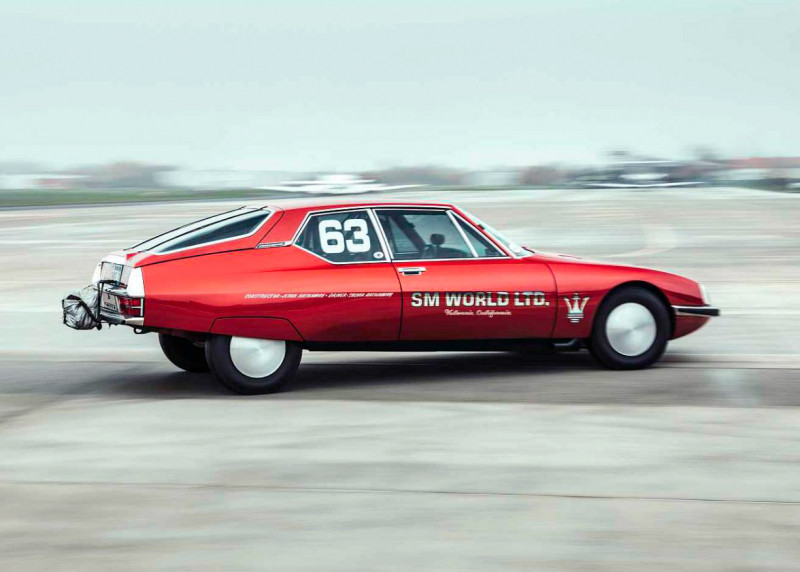
‘When those two turbos kick in… let’s just say you might wish you were still in the vast expanse of desert’
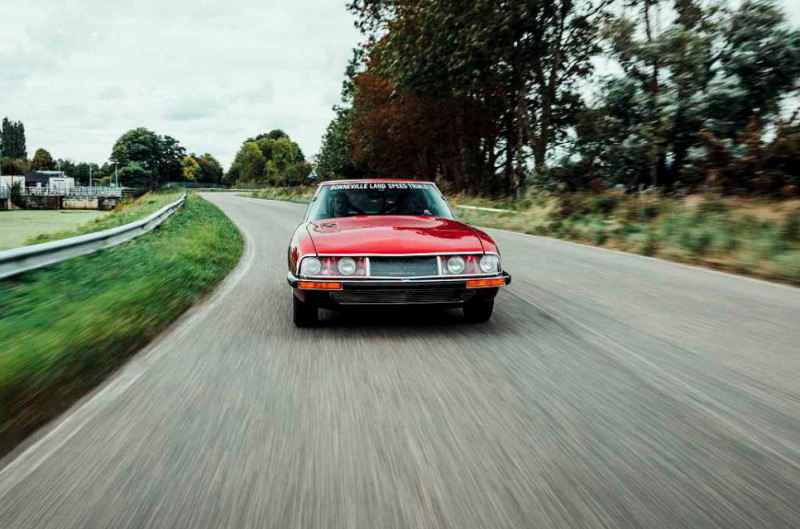
FASTEST EVER CITROËN – TWIN-TURBO SM AND ITS INCREDIBLE TOW-RIG
A few months before he died, suddenly and sadly in September 2021, I interviewed him, during which he confirmed: ‘The first book I bought was Petersen Publishing’s Basic Cams, Valves and Exhaust Systems. I read the book so many times I had it memorised.’ He started buying, fixing and selling cars at 16, then hot-rodded several as he developed his skills, asking questions and gathering knowledge from more experienced colleagues. When SMs came in for service at the Buick dealership that employed him and scared off those more content to work on simple Detroit products, Hathaway was fascinated.
‘The SM pick-up is a pleasant tow-car to drive, perhaps made so by that characteristic suspension system’
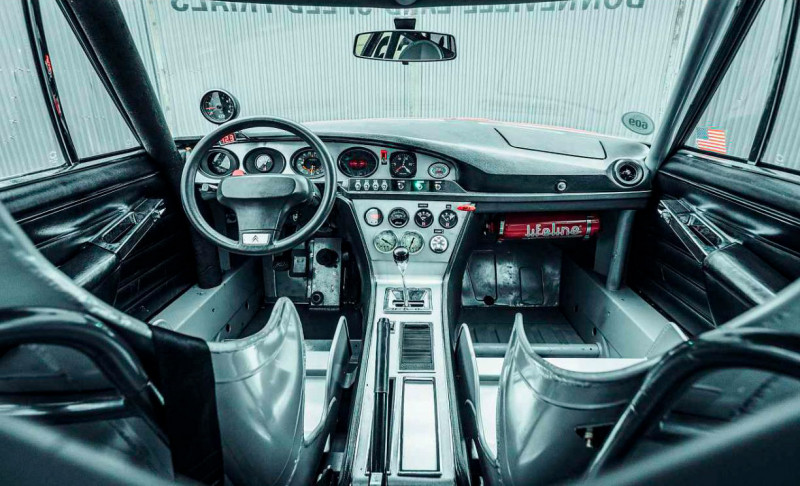
‘The SM sure provided a lot of challenges, and I was ready for all I could get. I had become bored with Buicks. But I had no idea what an adventure the SM would turn out to be.’ He asked management to let him work exclusively on SMs but was told no. So then he looked at opening his own workshop, though the timing was unfavourable: ‘From early in 1972, Citroën’s West Coast headquarters was sending to me SM owners who’d been complaining about the service at whatever dealer they had been going to. But by late ’73 no more new SMs were coming into the country. Bob Murphy, at Citroën’s Marina del Rey office, then suggested I talk to Larry Reed Sports Cars in Beverly Hills, which I did. I made the move to Reed’s workshop in July 1974 to work on SMs full-time. Most SM owners whose cars I had serviced before followed me there.’
‘The car set new records at El Mirage and Bonneville, and more was soon to follow’
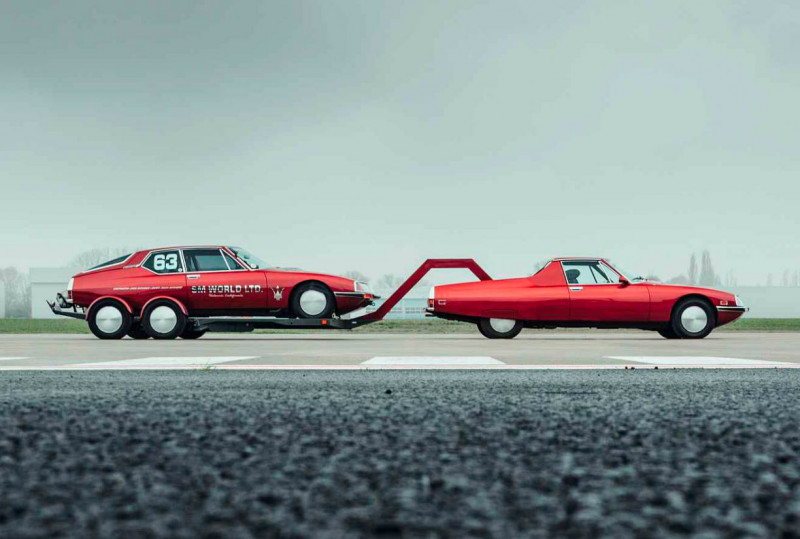
Our man was happy but his ambition was not sated, and 1976 proved to be a key year. Reed became a Lancia dealer, but Lancia pressured him to end one of his other franchises, as it felt that his shop was too small to cater for Fiat, Citroën and Lancia. As the French were no longer selling their products in the US, the choice was easy. Yet Lady Luck looked kindly upon Hathaway, not once but twice: first Citroën, knowing how keen he was, said he could buy Reed’s franchise and move it out of Beverly Hills. Then came the big break: a double chevron licence for free. ‘Mr Reed and I got along great, so he said, “Buy my parts and tools and it’s all yours.” What a deal for me.’
Hathaway then started SM World, first in Van Nuys with one mechanic, then a second shop for paint and bodywork.
He was in the best market in the world, with hundreds of SMs in a climate that meant they could be used all year round: having established a strong reputation, his dream of staying small was hopeless. ‘The business exploded; we got very, very busy. By mid-1979 there were 11 employees. But I did not want to be just a business owner, I wanted to work on SMs. Only in Los Angeles did people put over 3000miles per month on their SMs, so we saw them often. We were doing timing chain jobs every 50,000 miles. By the late 1970s, many had been driven more than 100,000 miles.’
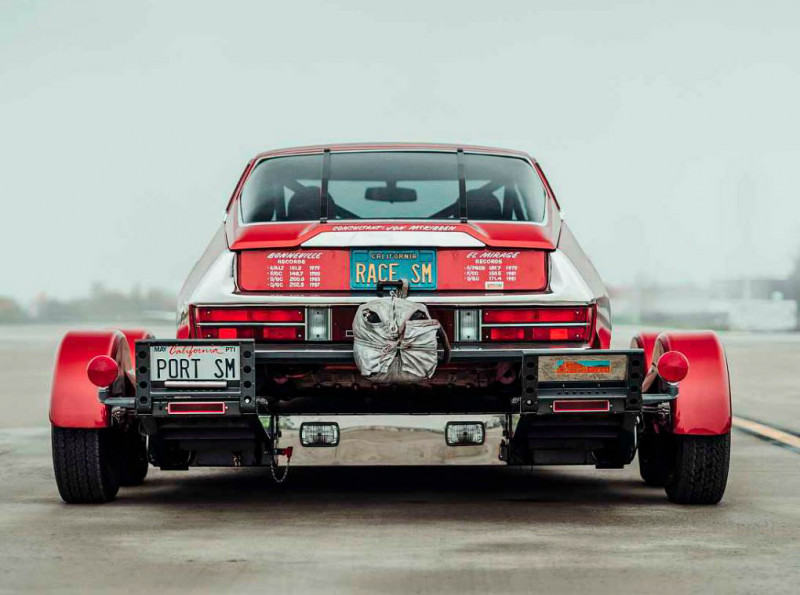
With his prosperity assured, Hathaway was yearning to create something special. ‘One of my clients, Jon McKibben, was an ex-Chrysler engineer and Bonneville salt flat racer. He talked me into building an SM for the salt flats.’
The first order of business was aerodynamics. To ensure no high-speed lift, the front was run as low as possible, and the rear almost all the way up. To achieve that, Hathaway separated the hydropneumatic suspension’s front and rear lifting controls, with two adjustment levers instead of one. This also helped to reduce drag.
El Mirage dry lake saw the car’s very first run in May 1979. Three engines were built for that summer’s Bonneville trials, ported and flowed with compression ratios lifted from 10:1 to 12.5:1, and uprated camshafts. The car set new records for the normally aspirated category at El Mirage and Bonneville in the 140-150mph bracket. And more was soon to follow.
Since the car was stable, in 1980 Hathaway felt it was time for more power. With twin turbochargers, could he join the 200mph club? Typically, he bought a book on forced induction and absorbed the information within it. Then he fabricated new headers and experimented. Our man again got it right: ‘When building a new turbo system on an engine that had never had one, one thing that was difficult to accomplish was to make more intake boost pressure than exhaust pressure. This is what improves efficiency tremendously. Well, we had this from the first time we got the jetting and ignition timing dialled in.’
With the 750 Holley racing carburettor set-up, the car ran over 170mph and set a new record. But it wasn’t all plain sailing. ‘At the time it was not required to pull the drag parachute so, being a bit lazy, not wanting to repack the ’chute, I decided to not activate it. I was a bit surprised to find that at over 170mph the brakes do not work as well as at 150mph. The run-off area is only about a third of a mile after the timing lights and then you have spectators crossing the course in cars, motorcycles and campers; you must have your race car slowed down and under control.’
With undersatement, he told me: ‘That was a bit scary. I’d turned the brakes into scrap metal. From then on I always activated the ’chute!’
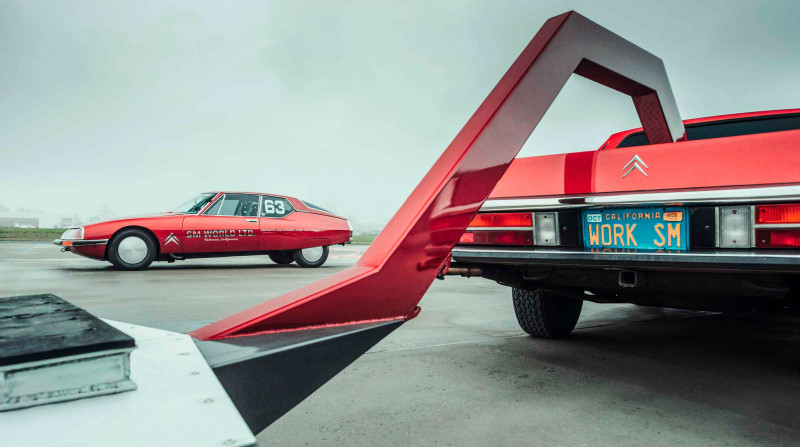
Inclement weather at the salt flats meant that the next run wasn’t until 1984, when Hathaway reached 190mph – close, but off-target. Then, in 1985, it all came together, with Hathaway hitting 200.002mph. The engines could stand only three runs at that speed but Hathaway worked a lot on oil cooling, with twin coolers from a helicopter. Finally he created a dry-sump system, which made the engine much more reliable.
Hathaway skipped Bonneville in 1986, spending his time creating an SM pick-up to tow the record car on his bespoke flatbed, lengthening the pick-up so that the combination looked just right. Predictably, it has a plethora of available adjustments built in. Then the team went back the following year so Hathaway could get his wife Sylvia into the club – with great success. ‘She beat my own time to achieve 202.361mph. We had an estimated 530hp.’
That was the end of the record-breaking adventure, and the rig was proudly displayed at Hathaway’s company HQ.
In 2013, during a visit to California, I visited Jerry Hathaway at his SM World workshops in Santa Clarit, north of Los Angeles. He had infectious enthusiasm and had prior to that been instrumental in putting me in touch with the person who wrote the foreword for my book, a certain Jay Leno, Octane columnist and a true SM aficionado. Jay had great respect and fondness for Jerry: ‘When it came to the Citroën SM, the man with the knowledge was Jerry Hathaway. He was literally a walking encyclopaedia on this unique and iconic automobile. I first met him in the early ’90s when I bought my SM from him. It was always important to him that people get the best one they could find. After I bought the car I would get follow-up phone calls – “Is it running OK?” I’ve had mine now for almost 30 years, I’ve never broken down or been stranded in it. The odometer has just passed 130,000 miles and it runs as good today as the day I got it. Rest in peace, old friend, your legacy is assured.’
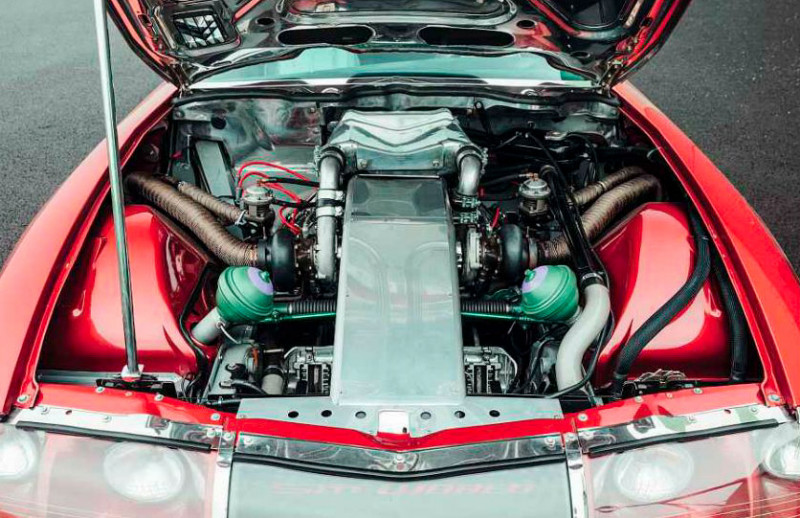
Eight years later and, after a bitter divorce, Hathaway lost the rig and his ex-wife had it auctioned by Gooding & Co in January 2021 at Scottsdale, Arizona. It was bought by the Belgian SM enthusiast Thierry Dehaeck. Hathaway knew at least that it had ended up in good hands.
‘I have loved SMs since childhood and started with the regular SM coupé, but very quickly hoped to own one bodied by Henri Chapron,’ says Dehaeck. ‘I was lucky enough to be able to purchase the second SM Mylord of five, then, some years later, the SM Opéra followed, of which Chapron made seven. Even more exclusive is the SM Espace by Heuliez, and four years ago I bought the one that was exhibited at the 1971 Salon de l’Auto in Paris.’
Naturally, Dehaeck found out about the Scottsdale sale. ‘I was very pleased that a lot of friends emailed Jerry Hathaway to say that the rig was in good hands. Of course, I contacted Jerry myself and explained that I was going to extend my building, by adding a third wing especially for the Citroën SMs and, of course, for the rig. He was kind enough to send me lots of documentation about it, as well as the passenger seat of the salt-flat racer, so I could register the car in Belgium. I salute a great man, an engineering genius. We all lost our best Citroën SM friend.’
Hathaway had been astonished by the fact that Thierry Dehaeck wanted to make the record-breaker run again, and that is how I find myself driving possibly the most unlikely tow-car coupling ever made. You can certainly feel the weight, though the SM pick-up is a very handy and pleasant tow-car to drive, perhaps made so by that characteristic suspension system. However, the flatbed was constructed to American dimensions and, while it was not an issue in the vast open spaces of California, it is 6cm wider than is legal for use on Belgium’s public roads.
The elaborate bespoke trailer was a particular pride of Hathaway’s, another marvel of engineering worthy of its own story. It has more hydraulics than an aircraft carrier, with a battery-powered system that keeps it autonomous and independent from the tow-car, and it is made to function and handle the road with supreme ease whether empty or laden.
Now for the beast itself. The record-breaker’s engine bay is quite a sight, with a huge air intake covering the two AiResearch turbos and the four-barrel Holley carburettor. To make room for them, the steering rack had to be tilted differently, which can make the steering feel a little inconsistent, and the hydropneumatic system was rearranged as well. The differential ratio is longer, one that Lotus used. Hathaway had intended to mount an intercooler but faced the problem of the carburettor being low-down, so the mixture has a bit more distance to travel than would be ideal. Dehaeck’s technician muses that fuel injection would have opened up another level of performance.
The overriding impression is of how cleverly it was put together, as Dehaeck confirms: ‘When the rig arrived in our garage, my mechanics were astonished by the ingenuity of the racer, pick-up and trailer. Everything was so well thought out and so professionally done. It deserves the greatest respect.’
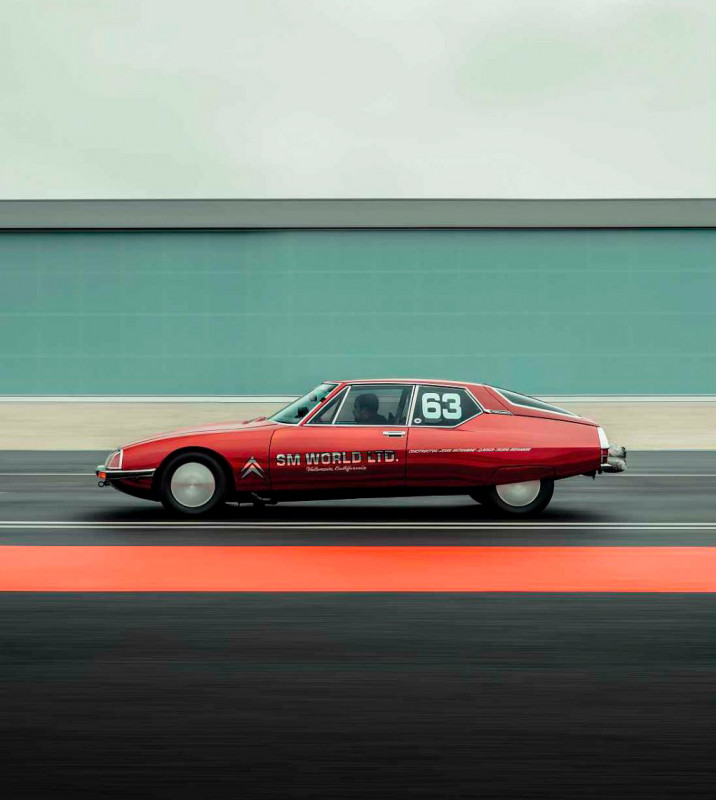
Riding shotgun at first as the technician drives and explains how to tackle it, you hear all sorts of noises, with lots of clicking and whirring going on. He then presses an anti-lag switch, which spools the turbos. It also happens to shoot large flames out of the stubby exhausts, which sounds like a gun battle and certainly turns heads!
To drive the record car you first have to access the deep metal bucket seat, easier for skinny types. As you might expect, the dashboard looks totally different behind the traditional SM wheel, with enough gauges that Captain Nemo would approve. A large rev-counter sticks out above the dash at left above a digital voltmeter, and there are others for air:fuel ratio, exhaust temperature, water, oil, boost and LHM pressure, the latter front and rear (vital, as the car has to keep its low-nose, high-rear stance to avoid top speed lift), plus fuel pressure, exhaust pressure in red and manifold pressure in white. Boost comes in at 4000rpm and the engine can be pushed all the way to 8000rpm – a normal SM’s Maserati V6 is best not ventured beyond 6600rpm.
An override button switches the fans on when desired and there is a heater for the air:fuel mixture. A beefy extra hydraulic pump is in the boot, electrically driven, and there are two batteries but no alternator. The fuel tank is standard SM. Finally there’s the parachute, essential to retardation, as Hathaway found out wide-eyed, but that’s one button we’ll leave alone today. In a major departure from the standard SM there is no power steering, so U-turns are gym intense, though once at speed you do not miss it. And it tracks straight as an arrow, which was no doubt a key set-up quest.
The turbo-lag is more extensive than Utah but that is utterly irrelevant as there were miles to get up to speed on the Bonneville salt before the timed segment. Acceleration is already impressive before the two turbos kick in, but when they do…let’s just say you might wish you were still in the vast expanse of desert. The boost is progressive yet almighty and relentless, allowing you to reach hair-raising speeds with very little effort, Robert Opron’s sleek shape making light work of cutting through the air, yet with remarkable stability.
Thierry Dehaeck’s knowledgeable technician mentions how mighty it felt when, on a remote road, the boost came on in fifth gear. It is certainly easy to imagine how Hathaway’s pride-and-joy achieved its world records.
So let’s hail a successful American dream with a uniquely French touch, the fastest Citroën of all time: here’s to you, Jerry Hathaway. André Citroën would surely have raised his hat in tribute.
THANKS TO. Thierry Dehaeck of Cadycars.be, and Jasper Geys.
Below and right The late Jerry Hathaway became the USA’s leading SM specialist – and created this record-breaking twin-turbocharged salt-flat racer.Clockwise, from above The racer, on specially built hydro-suspended towing rig, towed by unique SM pick-up; twin-turbo V6 good for 530hp; bucket seats and a few more dials than usual on the dash.
Above, and below left Self-levelling suspension makes SM pick-up a natural for towing; matching yet selfcontained hydropneumatic suspension in the rig.


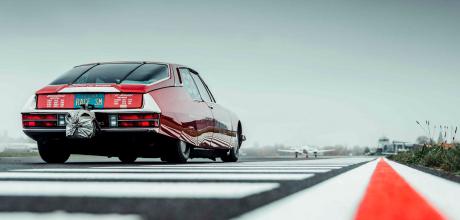
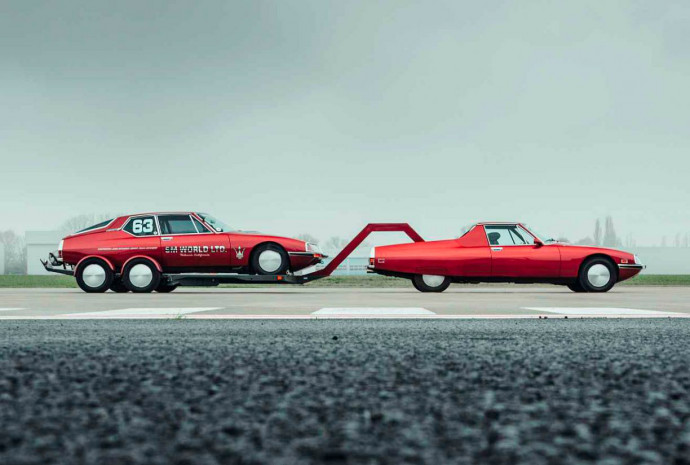























SM enthusiasm
Chapeau! for your excellent feature on Jerry Hathaway’s Citroën SM racecar, truck and trailer.
Jerry was a very dear friend, whom I had the pleasure of visiting for 12 years, until Covid hit. I would spend two to three weeks annually learning and doing all things SM under Jerry’s supervision in his Santa Clarita workshop [below] before returning to Oz and passing my findings on to the local SM enthusiasts. Regarding his willingness to share his expertise, he commented: ‘All I want [to see] is that SMs are running good.’ As for the rig being sold to Europe, Jerry was pleased that it would form part of an impressive SM collection and that European enthusiasts would be able to see it. Personally, I was touched by Marc Sonnery’s closing lines: ‘Here’s to you, Jerry Hathaway. André Citroën would surely have raised his hat in tribute.’